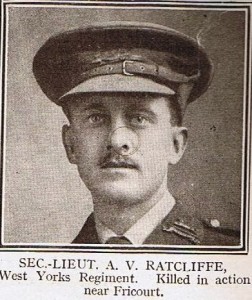 Born in 1887 in Gravesend, Kent, Alfred Victor Ratcliffe was a one of the lesser known Great War poets who tragically lost his life towards the end of the conflict and is noted for a couple of poignant works that were later published in the anthology The Muse in Arms.
Born in 1887 in Gravesend, Kent, Alfred Victor Ratcliffe was a one of the lesser known Great War poets who tragically lost his life towards the end of the conflict and is noted for a couple of poignant works that were later published in the anthology The Muse in Arms.
He came from a well-to-do family and he was the third born of three sons to Florence and Frederick Ratcliffe. His mother was the sister of a millionaire chemist and there were various links to literary and political figures of the time. He enjoyed a comfortable, almost idyllic, upbringing near the coast of Kent where there was no hint of the carnage to come in future years.
Ratcliffe attended Dulwich College as a youth and was a creditable student, moving on to Cambridge where he graduated at the outbreak of war in 1914. Whilst at university he became friends with another, more well-known, war poet Rupert Brookes.
Ratcliffe initially became Master at Sidney Sussex College in Cambridge but immediately enlisted in the army, essentially foregoing his career as a barrister and any serious thoughts of becoming a poet. He also put on hold his marriage to Pauline Clough to whom he was engaged. He had already written one collection of poetry prior to the outbreak of war, under the title A Broken Friendship and Other Verses which was published in 1913.
With his Cambridge background, Ratcliffe was made a lieutenant in the West Yorkshire Regiment. He and his men were quickly sent to France where they took part in a number of battles before finally heading to the Somme in 1916. It was whilst sitting in the trenches between battles that he wrote poems such as Optimism.

He composed the work June Song just a couple of weeks before he was killed. Ratcliffe died on the first day of the Battle of the Somme after taking charge when his commanding officer was killed. He was buried at Fricourt in France near where he fell.

Along with other poets, Ratcliffe’s works were included in the anthology The Muse in Arms that was published in 1917, about a year before the end of hostilities. The collection was unusual in that it brought together works from all branches of the armed forces and was divided into fourteen different sections. Of the 46 authors included in the anthology, 16 had perished in the war at the time of publication, including Ratcliffe who was just 29 when he died in 1916.
His work also appeared in anthologies such as A Treasury of War Poetry and Soldier Poets: Songs of the Fighting Men.

